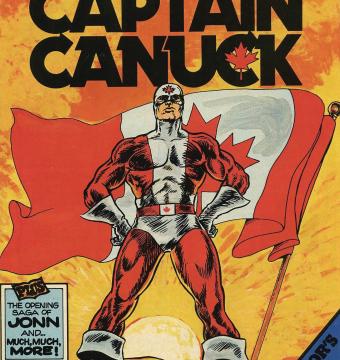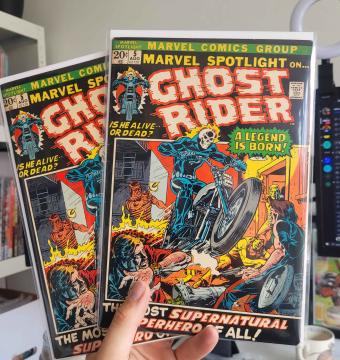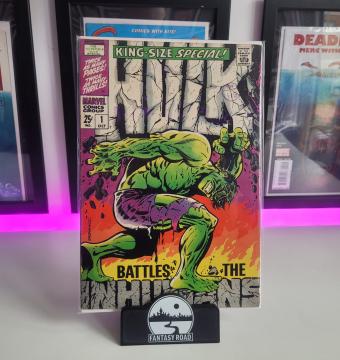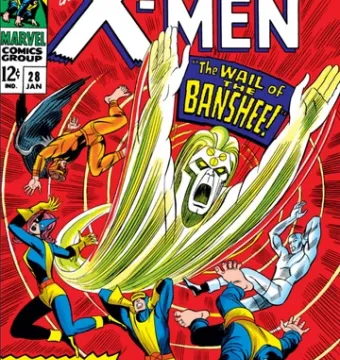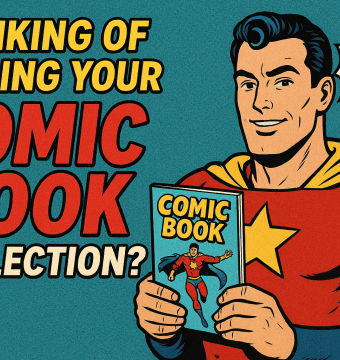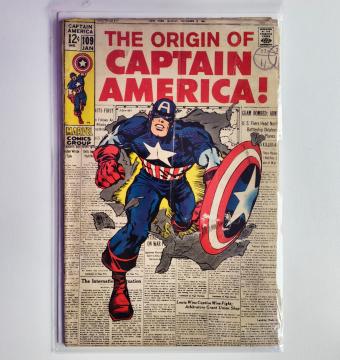As most of our tasty little tidbits start, this one, begins in the morning. But this time, not ours.
Our Oxford seller woke up this weekend, down and depressed, wondering where their life was going. Slowly, he turned his attention to the heavens, praying for a sign. Any sign. Anything that would make his day better. Then it happened. To look heavenward, meant to stare right up into the ceiling. A ceiling, that was below a loft. A loft, that contained... That's right! Comics! (P.S none of this first part actually happened. Or it might have. Who knows?)
So he we are, our Oxford legend lifting that loft hatch with trepidation. Now, put yourself in our main characters position. Imagine yourself stumbling across a box in your attic. You expect mothballs, an old VCR remote, maybe even a family of highly judgmental spiders just biding their time to skitter, nay DANGEROUSLY skitter, up your leg when you least expect it. Instead? Boom. You’re staring down the very first appearance of the X-Men, an Avengers run so complete it could make Stan Lee himself call out from his grave, and a Fantastic Four storyline involving a man who literally eats planets for breakfast. Talking of, I find myself rather hungry.
Well, believe it or not, that’s exactly what happened with our most recent pickup in Oxford. A city usually known for its posh colleges, endless (and incredibly annoying) bicycles (like, dude. ARE YOU A VEHICLE OR ARE YOU A PEDESTRIAN. I joke, I joke. Or do I?), and people who pronounce “scone” in ways that start arguments at family gatherings. But forget the dreamy spires of the Oxford Cathedral... These were... Uh, boxes. Boxes stuffed to the brim, with Silver Age Marvel comics. SHABOOYAH.
So, if you’ve ever wondered, “Where do I sell comics UK without being scammed on eBay by a bloke called BigDave92?” - you’re in the right place.
The Oxford Comic Book Treasure Trove
Let’s break down what we actually found:
-
Avengers Vol. 1 #1–100
Yup, an entire, mf'in complete run, from the first appearance in 1963 right through to the centennial issue. Key highlights included:
-
Avengers #1 – Earth’s Mightiest Heroes unite to fight Loki (who, frankly, has been fighting everyone since).
-
Avengers #4 – Captain America thaws out of his ice cube and rejoins the team.
-
Avengers #57 – First appearance of Vision, a synthezoid who is basically a toaster with feelings.
-
X-Men #1 (1963)
The first appearance of Professor X, Cyclops, Marvel Girl, Iceman, Beast, and Angel. This is the grail.
-
Fantastic Four #48–50 (1966)
The Galactus Trilogy. First Silver Surfer, first Galactus, and first time readers collectively screamed, “Hang on, did Marvel just invent a god who snacks on solar systems?”
-
Iron Man & Sub-Mariner #1 (1968)
A bizarre but rare issue created because of a publishing shuffle. It’s worth a surprising amount, considering it looks like Marvel couldn’t decide who deserved their own book, so just stuck them together like awkward flatmates. Fun fact? I hate this book. It's ALWAYS low grade... BUT NOT THIS TIME.
-
Amazing Spider-Man #50
First Kingpin. Iconic red cover. Also known as “the one with Peter quitting” - though like every superhero ever, he lasted about five minutes before donning the spandex again. Except batman. That spoilt rich little bell sleeps in his gimp suit, crying about his dead parents.
Needless to say, we were buzzing harder than Thor’s hammer at a lightning festival.
Why Silver Age Comics Are So Valuable
The Silver Age of Comics (1956–1970) wasn’t just about dodgy haircuts (COUGH GUY GARDINER COUGH) and technicolour printing. It was the birth of modern superheroes.
Here’s why Silver Age comics (especially Marvel) are worth serious money:
-
First Appearances – Debut issues of heroes like the X-Men, Avengers, Spider-Man, and the Fantastic Four are essentially the “original shares” of the Marvel Universe. Get a big'un? Hold tight and ride the rocket to the moon.
-
Cultural Importance – These are the stories that built the MCU juggernaut. Without them, no billion-dollar films, no Chris Hemsworth memes, no endless arguments about who’s stronger: Hulk or Thor. Plus, Marvel is such an intrinsic part of life now, that they are literal pieces of history. These little sheets of paper, contain the debut appearances of characters, that without exaggeration, changed the world.
-
Scarcity – Newsflash: kids in the 60s didn’t bag-and-board their comics. They read them until the covers fell off, used them as makeshiftFrisbeess, or swapped them for football stickers. High-grade copies are rare. Now, in the age of preservation, everything is graded. Everything is bought in doubles, one to read, one to preserve. This, makes everything past the silver age, worth much less.
-
Nostalgia – People love buying back the childhood treasures they once lost. It’s cheaper than therapy. You know that feeling you felt as a child, reading that issue for the first time? Or what you saw when you first saw your favourite cover? That's exactly what people are chasing.
If you’ve got a stash of old Marvel or DC issues in your loft, you might be sitting on a comic book pension plan.
How to Sell Comics UK (Without Tears or Tragedy)
Okay, so you’ve got comics. You’ve realised they’re likely worth more than pocket change. Now what?
Here’s a quick guide to selling comic books in the UK:
1. Identify What You’ve Got
In the same way that not all mnen are created equal, neither, are comics. Batman #500? Worth a couple of pints. Batman #1 from 1940? Worth selling your house for. Look for:
-
Key issues (first appearances, deaths, major storylines).
-
Early numbers (single digits are sometimes gold). Having said that, the value usually doesn't lay with the first issues of a run, as most people assume. It's often, the book that you least expect. Basically DO YOUR RESEARCH.
-
Condition (is it minty fresh, or does it look like someone wiped jam on it?). In the age of preservation, everyone and their pet cat Jaffa, are looking to grade everything they buy. This, means that low grade, which used to be better than no grade... is often not the case anymore. a single tear, could be the difference between £1,000, and £10.
2. Learn the Grading Game
Comic book values are determined by grade - from Poor (0.5) to Gem Mint (10.0). Even small flaws matter. A crease, a tear, or a coffee stain courtesy of Uncle Barry back in 1973 can cut values, quite literally, in half.
We’ve got a handy Comic Book Resources section that lists many resources that you can use to learn more about this.
3. Avoid the Pitfalls of eBay
Yes, you can sell comics online yourself. But here’s what no one tells you:
-
Shipping disasters happen (ever seen a £5,000 comic folded into a shoebox? We have).
-
Time-wasters abound. For every serious buyer, there’s three messages asking, “Will u take £5 m8?”
- Scammers. Scammers, scammers, scammers, scammers. This isn't unique to eBay, but places like Facebook, Vinted, even gumtree, are absolutely riddled. Why waste the time dealing with these people, not to mention the risk, when you can just spend give minutes with us, and get it sorted in a Flash? Pun intended.
4. Work With Reputable Buyers (Like Us, Wink Wink)
If you want to skip the nonsense and just sell comics online quickly, that’s where we come in. We buy collections across the UK. No faff, no dodgy PayPal disputes, no weird strangers in your living room.
We also buy other geeky treasures:
Because let’s be honest, if you’re a collector, you probably hoard all of the above.
The Pros and Cons of Selling Comics Online
Since half the UK Googles “Sell comic books UK online” every day, let’s break it down.
Pros:
-
Bigger audience (global nerds unite).
-
Potentially higher bids in auctions.
-
You can sell from your sofa while wearing pyjamas.
Cons:
-
Risk of scams and dodgy buyers. (except with us)
-
Time-consuming to list, photograph, and package.
-
Shipping damage = heartbreak.
Moral of the story: unless you enjoy stress, strongly consider a trusted buyer (like us).
Key Issues That Made the Oxford Collection Shine
If you’re here to geek out on specifics, let’s spotlight some MVPs from the Oxford haul:
-
X-Men #1 (1963) – Current market prices for a mid-grade copy can stretch into tens of thousands.
-
Avengers #4 (1964) – Cap’s glorious return. A solid investment book.
-
Fantastic Four #48 (1966) – First Silver Surfer. Every cosmic collector wants this.
-
Avengers #57 (1968) – First Vision. Demand soared after WandaVision.
-
Spider-Man #50 (1967) – “Spider-Man No More.” Iconic cover art by John Romita Sr.
These aren’t just comics. They’re blue-chip collectibles. The equivalent of vintage wine, but with more tights and punching.
How Much Is My Comic Collection Worth?
Ah, the million-pound question (sometimes literally). Here’s what determines your comic’s value:
-
Age – Older tends to be better (especially pre-1975). This is a generall rule of thumb, but an important factor to note, is that age is a multiplier. It, in itself, does not give a comic book value. If the boiok has potential for value, in the form of a key event, age, multiplies this value.
-
Condition – A Near Mint comic can be worth 100x more than the same issue in tatters. This, realistically, is the same for all collectibles, and not just unique to comics.
-
Key Status – First appearances and landmark issues trump filler ones. ONLY key issues have true value, that age can multiply. A book a week old with a key issue, could be worth £200, and a book a hundred years old without one could be worth a quid.
-
Market Demand – A movie announcement can suddenly spike prices. (Looking at you, Robert Downey Junior).
If you’re unsure, don’t panic-Google until your eyes bleed. Just reach out to us. Free valuations, zero obligation, maximum dad jokes included.
Tips for Storing and Preserving Comics
Even if you’re planning to sell, keep those comics safe in the meantime:
-
Bags and Boards – Think of them as medieval armour for your comics.
-
Boxes – Store upright, not flat, to avoid spine damage.
-
Environment – Cool, dry, dark. Basically treat your comics better than your houseplants.
We even wrote a whole post about it here: Comic Book Storage Tips.
The Joy of Selling Comics (Yes, Really)
Selling doesn’t have to feel like ripping off a Band-Aid. It can be:
-
Freeing – Reclaim your loft, banish the spiders.
-
Profitable – Put cash towards a holiday, a new car, or just a very big kebab.
-
Nostalgic – Relive the joy of comics one last time before sending them to a new home.
Plus, let’s be real... You can always buy more. Thankfully, that’s how collections work.
Final Thoughts: Why You Should Sell Comics UK Style With Us
The Oxford haul reminded us why we love this job: the thrill of discovery, the history, and the chance to help people turn stacks of paper into serious money.
If you’ve got comics lying around and you’re wondering, “Should I sell comic books UK now, or wait?” - the answer is simple: there’s never been a better time. The market is strong, demand is high, and your collection deserves to shine.
So whether you’re sitting on Silver Age gems, a longbox of 90s holographic covers, or that one issue where Superman fights a gorilla (yes, it exists), give us a shout.
And if you’re just here for the banter, check out our blog and videos - we’ve got plenty more tales of geeky treasure hunts.
